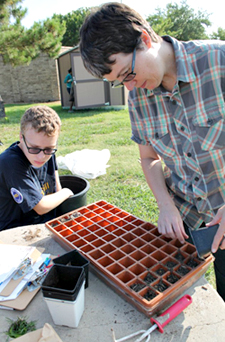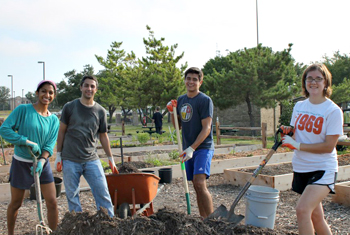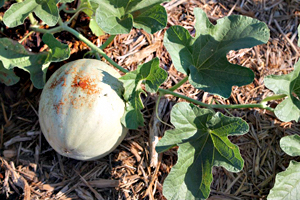Lectures, research and studying in his room left sophomore Michael Burleson itching to reconnect with nature.
He wanted to get his hands dirty. Spend time outdoors. Watch things grow.

Allene Nichols, a humanities PhD student, recently planted seed for the garden.
“I can’t stand being inside all the time,” he said. I’d seen the Community Garden here for a year, and finally had time for it,” Burleson said on a recent work day, where he pushed a wheelbarrow full of fresh soil to replenish a common area.
He’d gardened a bit at his family home in Wylie and was eager to grow things he knew how to cook with: tomatoes, basil, onion, rosemary and lots of garlic.
“My family’s Italian. I can put that on everything I make,” Burleson said.
The UT Dallas Community Garden gives students, faculty and staff the opportunity to grow their own fruits and vegetables and discover the benefits of natural gardening. New members like Burleson can learn from other UT Dallas students and even some master gardeners about what types of vegetables grow well in Texas, how deep to plant the seeds and how often to water.
Students organized the garden in 2006 with funding help from the UT Dallas Alumni Fund and Student Affairs. The garden was relocated this year to a fenced-in site near the intersection of Drive A and Drive H.
Plots are assigned on a first-come, first-served basis. There is no fee for a plot, but gardeners are required to attend group meetings, help with monthly work days and participate in garden events, as well as maintain their individual plots. Members must tend their plots at least once a week and garden throughout the semester.
Plots must be kept free of weeds, pests and diseases, and organic gardening methods are encouraged. Synthetic pesticides, herbicides, fungicides or fertilizers may not be used unless approved by the Office of Sustainability.

Students with plots are required to pitch in on Community Garden work days. Above during a recent work day are: (left to right) Jessica D'Souza, Rasoul Yousefi, J.T. Menchaca and Haley Bilbray.
“Minimizing chemical use fits in with our standard campus operations,” said Thea Junt, Sustainability manager. “It also makes sense to avoid synthetic chemicals in the Community Garden because we are raising food. And the most natural food benefits those who eat it as well as whomever cares for that plot in the future.”
Burleson appreciates that the Community Garden is environmentally friendly and that it helps students learn self-sufficiency.
“I feel we all have to enhance our commitment to the environment. Ultimately, everybody’s got to learn to do this in their own backyard,” Burleson said.
During a recent workday, a dozen or so students weeded common areas, then spread compost and raked wood chips in between plants around the garden.
Monalisa Amidar, assistant director of the Office of Student Volunteerism, handles membership and organizes workdays. Amidar said a few plots are still available for fall plantings, and the garden can be expanded if interest continues to grow at UT Dallas.
“It’s really like another lab for the students—a living, breathing lab,” Amidar said. “A lot of thinking and problem-solving goes on. They’re trying different things, and they have a lot of fun with it.”

Allene Nichols is growing cantaloupe in her garden plot.
Allene Nichols, a humanities PhD student, has worked one of the garden plots for a year and a half. Living in an apartment on McCallum Blvd., the garden is her only piece of land.
“It’s about touching the earth, being part of something living and growing,” Nichols said. “I think it renews me.”
Growing up in Central Illinois she was used to seeing rich farm land. In her plot this year, she’s experimented with growing peanuts, cantaloupe and even cotton.
The hot Texas summers haven’t withered her enthusiasm. “You come in the evening a lot,” Nichols said.
Suchithra Senevirathne, a PhD candidate in chemistry and her husband, Naleen Jayaratna, who is working on his PhD at UT Arlington, are known for having the greenest thumbs in the garden.
Their lush plot boasts Indian cucumber, eggplant, okra, bell peppers, corn, lettuce, tomatoes and marigolds—a natural insect repellant.
It’s easy to grow things in the Community Garden, said the natives of Sri Lanka, because members have access to prepared soil, compost and even some vegetable seeds.
Their garden plot has been so productive that the pair, who live in the nearby Waterview Apartments, share vegetables with their friends. “It gives us a lot of happiness,” Jayaratna said. “It’s really good for your heart. It keeps your mind calm.”